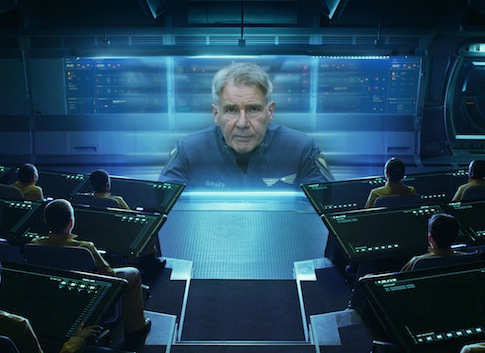Plot points throughout Ender’s Game are discussed in this review.
Of all the nerd adaptations in recent years—all the comic book films, all the Lord of the Rings movies, all the TV show remakes and reboots—Ender’s Game is the first property with which I have no prior familiarity. I’ve never read Orson Scott Card’s classic young adult novel, and I explicitly chose not to do so to see how the film holds up for the uninitiated.
I’m glad I chose this route. Because, to those who have never read the book, Ender’s Game is borderline incomprehensible.
There are parts of the film that work quite well. The journey of Ender Wiggin (Asa Butterfield) from bullied overachiever to commander of an intergalactic fleet is handled deftly, with a special assist from a pair of adult mentors. Colonel Graff (Harrison Ford) serves as a gruff father figure who helps Ender achieve greatness. Major Gwen Aderson (Viola Davis) worries for Ender’s mental state given the strain he’s under. They prepare him for the ultimate conflict with a race of bugs that attacked the Earth.
It’s the timeline of when the bug attack took place that is so problematic for viewers unfamiliar with the original text. The sequence of events makes little sense. We see the initial alien attack in newsreel flashbacks on television stations that have adopted Paul Verhoeven’s Starship Troopers-style, neo-fascist aesthetic.
The attack takes place close enough to our own time that the Earth’s militaries throw what look to be descendants of the F-22 at the swarms of alien ships hovering over human population centers. After killing ten million or so humans, the bugs are repelled by legendary pilot Mazer Rackham (Ben Kingsley). Humanity comes together to train young people to do battle with the insect-like hordes that invaded our planet.
Ender is a member of this cohort of trainees. By the time he is ready to go into combat, Earth has mastered intergalactic, faster-than-light travel, created some sort of energy weapon that disintegrates entire fleets of ships, and built a huge space armada of its own. This level of technological advancement, combined with the newsreel-style flashbacks, lead us to believe that by the time the narrative commences we have progressed a not-insignificant amount of time into the future.
After exceeding Col. Graff’s expectations at an Earth-bound training facility, Ender is sent to a space station to hone his skills as a leader. This middle portion of the film, which chronicles Ender’s journey through "Battle School," is probably the most effective segment. It is where Ender learns to harness his innate ability to strategize and earn the respect of his peers.
After excelling at Battle School, Ender is shipped off to meet the fleet, which has secretly been dispatched to the bug home world in an effort to eliminate them entirely before they eliminate us.
This final, apocalyptic conflict is what Graff has been training Ender for. But it’s also where the film comes apart at the seams, at least for me. Because once he arrives on the flagship, Ender meets the planetary hero Mazer Rackham who hasn’t aged and wizened at all, but is spry and ready for combat.
This means, of course, that the battle Ender has grown up idolizing could not have taken place long before his birth. And given the fact that he is but a teenager, we are asked to believe that humanity made technological quantum leaps in a matter of decades. Which is insane and confusing and destructive to the very fabric of the film.
Once on the forward operating base from which he will command the assault on the bug home world, Ender is run through a series of simulations to see if he’s prepared to lead the final attack. As tension mounts—and Graff and Rackham spring a surprise on Ender—the film circles around making a semi-interesting point about combat, sacrifice, perceptions of heroism, and the deleterious effect on the mental health of those who partake in remote-controlled military missions.
Director and writer Gavin Hood decide not to tackle that point head on, however. He is content to merely touch on it before flitting off to close the film with a ludicrous coda that negates virtually everything that occurred before and, again, makes no sense given what we have seen of the human high command’s decision-making process.
It’s all very frustrating, because there’s a kernel of a good, possibly even great, movie here. But between Hood’s aversion to basic exposition—and his obvious desire to give fans of the novel some semblance of what occurs in the book—irreparable damage was done to the picture.
